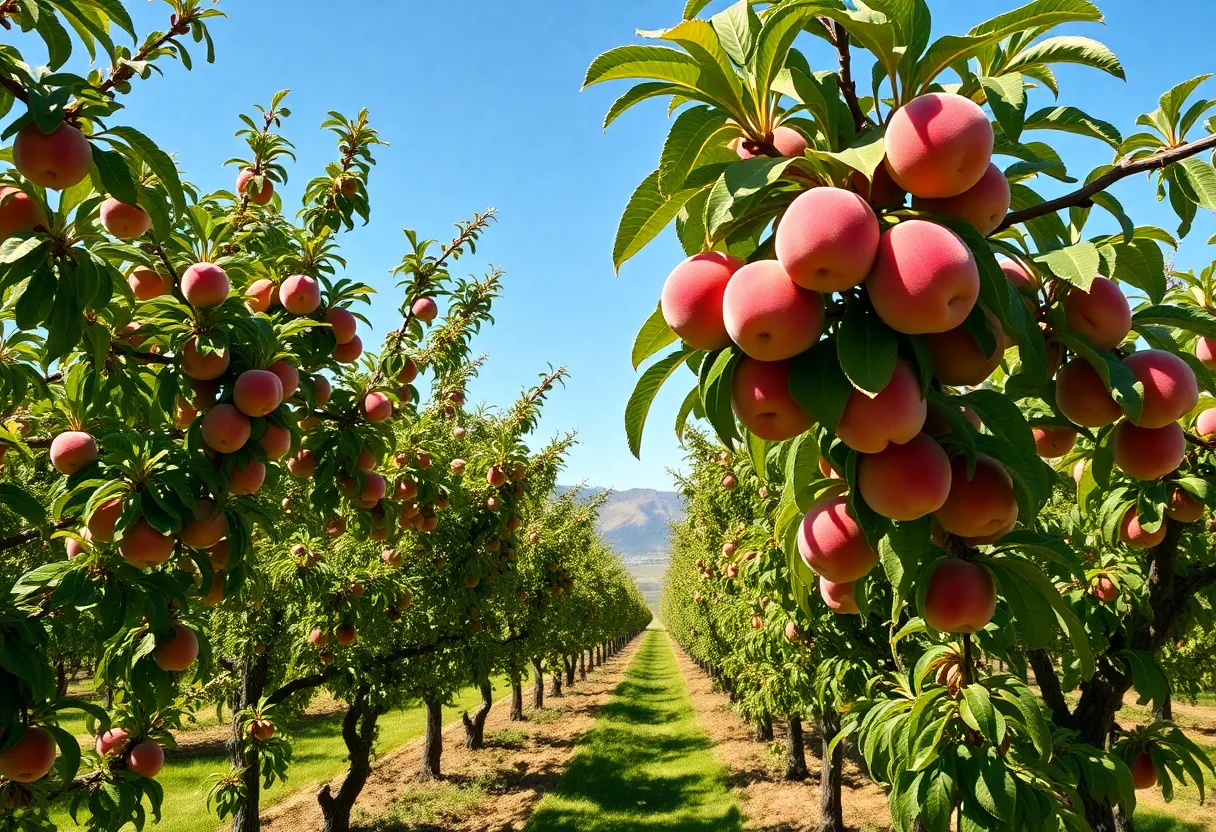News Summary
Farmers in California’s Central Valley are facing a 30% decrease in peach harvests due to climate change’s impact on growth cycles. Warmer winters disrupt essential chilling periods, leading to heightened prices and losses across major peach-producing states, including South Carolina and Georgia. With crops failing and economic stability threatened, farmers are adopting protective measures to mitigate the effects. The peach’s significance in agriculture makes these challenges even more pressing for local economies.
California
Farmers in California’s Central Valley are facing a challenging year for peach harvests, with the Masumoto Family Farm reporting a significant 30% decrease due to the impacts of climate change, particularly warmer winters that disrupt essential growth cycles. This decline threatens the economic stability of farmers who rely heavily on the short, intense 12-week peach season for their income.
The disruption caused by warmer winters has affected the trees’ sleep cycles, which are crucial for nutrient regulation. According to local farmers, trees require a specific number of hours below 45 degrees Fahrenheit to maintain their health and productivity. This past winter, unpredictable warm spells and inconsistent cold weather have resulted in challenges not only for peaches but also for other stone fruits such as plums, apricots, and cherries. Some growers have reported complete crop failures, further underscoring the severity of the situation.
Impact on Prices and Production
The consequences of the declining peach harvests are already being felt by consumers, with prices increasing for peaches. Yellow peaches have risen by 23 cents per pound, while white peaches have gone up by 17 cents per pound. Despite these challenges, the Masumoto family’s older groves and traditional irrigation methods have allowed them to maintain some production levels, managing to pack and ship around 10,000 pieces of fruit daily. Their use of furrow irrigation promotes soil health, contrasting with modern drip irrigation systems.
As the effects of climate change persist, farmers are increasingly worried about their crops and livelihoods. In response, many are adopting strategies to mitigate potential losses. This includes investing in protective measures like wind machines and burning straw to safeguard against late frosts.
South Carolina and Broader Challenges
In South Carolina, peach growers are facing similar predicaments. A recent late freeze has ravaged approximately 70% of their peach harvest. The situation is dire, with reports indicating that Georgia, once a leading peach producer, has seen a staggering 95% loss of its peach crop due to late freezes and uncooperative weather patterns. These developments highlight the vulnerability of peach farming, which is known to be labor-intensive and highly sensitive to climate fluctuations.
Agricultural experts note that the warmer winters have led to early blooming in peach trees, disrupting the synchronization of the harvest. However, advancements in breeding peach varieties that require fewer chill hours could provide a glimmer of hope for future production.
Historical Context and Economic Importance
Historically, Georgia produced the majority of the United States’ peaches, but South Carolina has since surpassed it in quantity. The state currently has about 15,500 acres dedicated to peach farming, contributing over $98 million to the South Carolina economy. This signifies the peach not only as an agricultural product but also as an integral part of the regional identity.
Challenges extend beyond climate to biological threats, with reports of a reemerging disease called phony peach disease (PPD), which is adversely affecting the quality and yield of peaches. As awareness of these challenges grows, there is potential for increased support and understanding of the peach farming industry, which faces a future uncertain due to climate change interactions.
In summary, both California and South Carolina’s peach farmers are grappling with the effects of climate change, which is reshaping production and threatening livelihoods. The economic implications are significant, highlighting the essential role of peaches in these states’ agricultural landscapes.
Deeper Dive: News & Info About This Topic
- CBS News: California Peach Harvests
- Wikipedia: Peach
- Macon: Peach Harvest Environment Article
- Google Search: Peach Harvest Climate Change
- The Guardian: Peach Harvest Southern US
- Google Scholar: Climate Change Effects on Peaches
- New York Times: Peaches and Climate Change
- Encyclopedia Britannica: Peach
- ScienceDirect: Peach Harvest Research
- Google News: Peach Production Weather Harvest
- The Atlantic: Fruit Climate Change Chaos
- Fox Weather: Peach Production Weather

Author: STAFF HERE SAN DIEGO WRITER
The SAN DIEGO STAFF WRITER represents the experienced team at HERESanDiego.com, your go-to source for actionable local news and information in San Diego, San Diego County, and beyond. Specializing in "news you can use," we cover essential topics like product reviews for personal and business needs, local business directories, politics, real estate trends, neighborhood insights, and state news affecting the area—with deep expertise drawn from years of dedicated reporting and strong community input, including local press releases and business updates. We deliver top reporting on high-value events such as Comic-Con International, San Diego County Fair, and San Diego Pride Festival. Our coverage extends to key organizations like the San Diego Regional Chamber of Commerce and United Way of San Diego County, plus leading businesses in biotechnology, healthcare, and technology that power the local economy such as Qualcomm, Illumina, and Scripps Health. As part of the broader HERE network, including HEREAnaheim.com, HEREBeverlyHills.com, HERECostaMesa.com, HERECoronado.com, HEREHollywood.com, HEREHuntingtonBeach.com, HERELongBeach.com, HERELosAngeles.com, HEREMissionViejo.com, and HERESantaAna.com, we provide comprehensive, credible insights into California's dynamic landscape.


